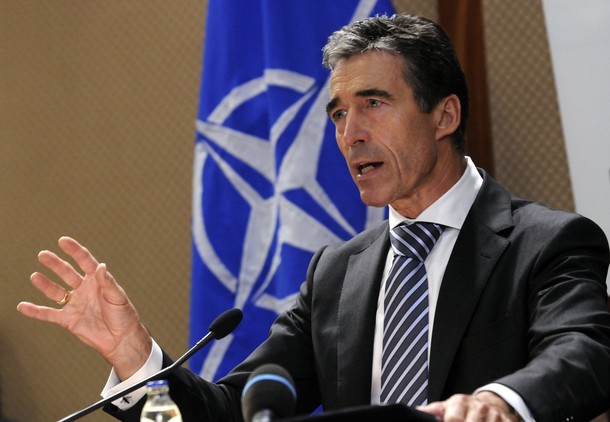
From Anders Fogh Rasmussen, NATO: Security is not an optional extra – even in times of austerity. It’s not a luxury – it’s a vital necessity. Because security problems don’t wait while we come to terms with our economic difficulties. And they certainly don’t solve themselves.
We may not be able to spend more, but we certainly can spend smarter by spending together – and that is what we must do. In the current economic climate, the need for cooperation is clearer than ever. The need for solidarity is stronger than ever. And the argument for transatlantic commitment is more compelling than ever. . . .
[I]n Chicago next May, we can help transform that vision into reality. I see four specific goals for our Summit.
First – Afghanistan. We are on track to complete the transition of lead security responsibility to the Afghans by the end of 2014. But our commitment to the Afghan people will not end there. So my first goal for Chicago is to lay out the detail of that commitment, by agreeing a strategic plan for our engagement throughout the transition period, and beyond.
Second – capabilities. To fulfil its essential purpose of safeguarding our security, the Alliance needs the appropriate mix of capabilities: conventional, nuclear and missile defence. We are currently reviewing that mix for approval at Chicago.
Third – missile defence. Poland, Romania and Turkey have already agreed to host key elements of this system. And my goal for Chicago is that we declare an interim operational capability for NATO’s territorial missile defence. We will then be able to receive early warning of missile launches directed against us. A big step towards the full capability that we need.
We are also preparing a package of specific military capabilities that Smart Defence can help us to deliver. At Chicago, my goal is for NATO Heads of State and Government to endorse this package. And to make a smart commitment to deliver the capability improvements we all need.
That’s the NATO track. But I would also like to make progress on the NATO-Russia track. Cooperation on missile defence makes sense militarily — because it renders both our systems more effective. And it makes sense politically — because it demonstrates that our missile defence is not directed against Russia.
Finally – partnerships. I would like the summit to reaffirm our commitment to the Euro-Atlantic integration of our partners here on this continent. But also to send a strong signal to countries across the Mediterranean, the Middle East and the Persian Gulf. That we continue to share an interest in the stability and security of their region. And I hope that by the time of our Chicago summit, a new, democratic Libya will be among our partners in the region. . . .
Our Libya operation showed once again the value of our Alliance. And it was not a one-off. NATO has a strong record of success that goes back over six decades.
My goals for Chicago are clear and concrete. They are ambitious. But achievable. They will strengthen the transatlantic relationship. And they will help to ensure that the Alliance’s record of success continues through this economic crisis, and well into the future. Because they will deliver an Alliance that is even more Committed. More Capable. And more Connected.
That’s my vision for NATO. At Chicago we have an opportunity to make it happen. And I am confident we will.
Excerpt from speech, “Towards NATO’s Chicago Summit,” by NATO Secretary General Anders Fogh Rasmussen at the European Policy Centre, Brussels. (photo: Getty)
Image: getty%209%2030%2011%20Anders%20Fogh%20Rasmussen.jpg
